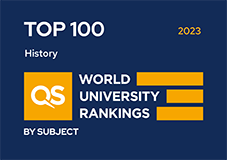Join our Postgraduate Open Day - Saturday 22 June
Register now

Birmingham was ranked as one of the world’s top 100 Institutions to study History in the 2023 QS World Rankings and the Department of History is ranked eighth in the country in the Research Excellence Framework exercise 2021 based on Grade Point Average, according to Times Higher Education.
We have an excellent research environment and also host major research projects relating to both contemporary and earlier periods. Researchers are supported by the excellent resources of the University Library, and have easy access to record offices and libraries in the region.
Students have access to working space and to computing facilities in the postgraduate suites shared with postgraduates in other related disciplines, through the College of Arts and Law Graduate School.
In addition to regular supervision, research seminars give staff and postgraduates the opportunity to present their findings, to discuss methods and results, and to meet and to hear papers from visiting scholars.
Our postgraduate degrees
We also offer a range of degrees in Heritage:
Postgraduate scholarships available

The College of Arts and Law is offering a range of scholarships for our postgraduate taught and research programmes to ensure that the very best talent is nurtured and supported.
Learn more about our scholarships
Request more information

The School of History and Cultures hosts workshops and seminars throughout the year in which students are invited to come and listen to the leading experts in respective fields discussing their work. They actively encourage student engagement, which creates a lovely sense of participation and contribution.”
Rose Parkinson (Ask Rose a question here)